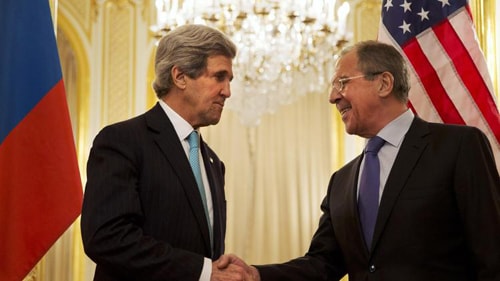Russia, US still cannot find common ground on Ukraine
Despite many negotiations, Russia and the United States still cannot find a solution to the Ukraine crisis.
On March 30, Russia and the United States once again agreed that the crisis in Ukraine must be resolved through diplomatic means. However, after 4 hours of negotiations in Paris, US Secretary of State John Kerry and Russian Foreign Minister Sergei Lavrov were unable to find common ground to resolve the Ukraine issue.
 |
| US Secretary of State John Kerry and Russian Foreign Minister Sergei Lavrov during a meeting in Paris on March 30 (Photo: AP) |
AP quoted Mr. Kerry in an interview with reporters at the US Embassy in Paris after a meeting with the Russian Foreign Minister saying: "The Russian military buildup in the Ukrainian border area creates an atmosphere of fear and tension in Ukraine. This action by Russia does not create the necessary environment for dialogue."
Previously, the US accused Russia of mobilizing tens of thousands of troops to the border with Ukraine to threaten the country's new leaders after taking Crimea from Ukraine.
Mr. Kerry noted that even if the Russian army remained only present on Russian territory, without spreading into Ukraine, this would still create a negative atmosphere.
“The question is not whether Russia has the right or the legality to deploy its military forces,” Kerry said. “The question is whether it is appropriate and wise in the current circumstances.”
According to an unnamed source, Mr. Kerry proposed the idea of Russia withdrawing troops from the border area with Ukraine, but in response, the Russian Foreign Minister did not make any promises regarding the withdrawal. Mr. Lavrov only promised to present these proposals to the Kremlin leader.
At a separate press conference at the Russian Embassy in Paris, Lavrov also made no mention of troop withdrawal. Instead, he outlined Moscow’s idea of a federal Ukraine, in which many regions would enjoy greater autonomy.
Mr. Lavrov also affirmed his special concern for the Russians, Russian-speaking people currently living in southern and eastern Ukraine.
The Russian Foreign Minister said that Ukraine does not function as a “unitary state” and should follow a federal model with different regions free to choose their own financial, economic, social, linguistic and religious models.
Mr Lavrov argued that every time Ukraine elects a new president, the country adopts a new constitution, which shows that Ukraine is a state model that “does not have unity in its functioning”.
According to Mr. Lavrov, Ukrainian officials are currently very cautious about decentralization because they fear that pro-Russian regions will hinder their aspirations to “lean” toward the West. However, the US side believes that any changes related to the choice of the future state model of Ukraine must be decided by the people of this country.
“We are not discussing the form of statehood in Ukraine,” Mr. Kerry said. “That is not our business, nor do we have any right to discuss it. That is the choice of the Ukrainian people.”
“We cannot accept any discussion about the future of Ukraine without the presence of the legitimate Ukrainian government. No decision on Ukraine will be made without their participation,” the US Secretary of State added.
For his part, Mr. Lavrov denied Kiev’s accusation that Moscow was trying to “divide Ukraine.” Mr. Lavrov said: “The federal model is not an attempt to divide Ukraine, as the Kiev authorities fear. On the contrary, a federal state would bring common benefits to all regions of Ukraine.”
Mr. Lavrov also said that he and Secretary of State Kerry agreed to work with the Ukrainian government to improve the rights of Russian speakers in Ukraine and to quell extreme nationalist forces in the country.
The Russian and US foreign ministers have had many face-to-face meetings and phone calls since the Ukraine crisis broke out, however, the two sides have not yet been able to find a solution to resolve the political deadlock in this country. It is expected that Mr. Lavrov and Mr. Kerry will continue to have meetings to discuss the Ukraine issue at the NATO Foreign Ministers' meeting taking place from March 2-3 in Brussels, Belgium./.
According to VOV






